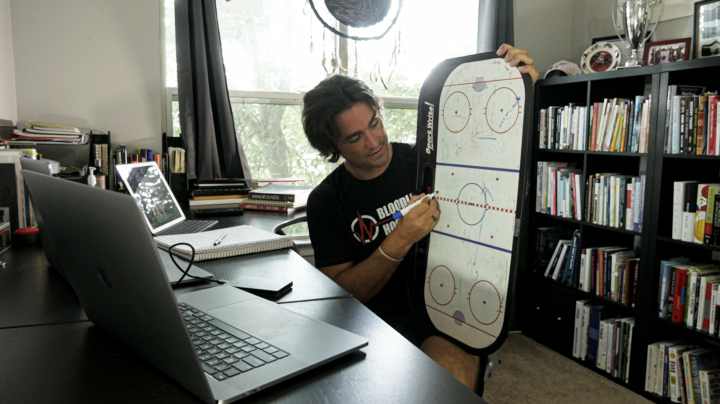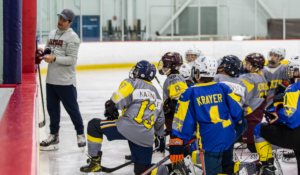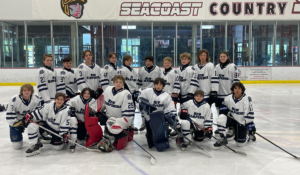Understanding the mental side of hockey and training
Skating coaches. Skills coaches. Strength coaches. Goalie coaches.
There’s an instructor that specializes in every physical aspect of the game. But what about, arguably the most important phase, the mental game?
Vince Malts has been a mental performance coach for nearly a decade. His company, Bloodline Hockey, has worked with highly committed youth, junior, college and professional athletes around the world to improve their mental capabilities in on-ice performance.
Malts was raised in the sport, playing AAA hockey in his youth before going onto the Quebec Major Junior Hockey League (QMJHL). He was eventually selected by the Vancouver Canucks in the 1998 NHL entry draft, and enjoyed a seven-year professional career playing in the U.S. and Europe. Malts has since moved on, giving back to the game that gave him so much, serving as both a head coach and assistant coach at junior-A, midget minor and midget major levels as well as scouting as an evaluator.
Most recently, he was hired by the Chicago Blackhawks to serve as the organization’s mindset performance manager.
“I also worked with Selects Hockey for over a decade, where I had the opportunity to spend my offseasons with some of the best up-and-coming players in the world, who are now in the NHL,” he said. “I have learned and been obsessed with the high-performing culture of hockey my entire life. My teaching journey is rooted in one fundamental question… ‘What is the easiest and most effective way to teach players how to sustain their best performance every day?’ This question keeps me pretty busy, and I have a ways to go before we figure out the answer for all high-performing hockey players out there.”
Mental performance training, Malts said, is more about learning how to create and sustain what he calls ‘mental solutions.’ In a world full of so much information and noise in the high performance world, it’s very important to develop and adapt mental strategies for your own game. Just like certain exercises and movements strengthen muscles in the gym, Malts’ approach purposefully works the mind. This focuses on what makes each player a valuable performer, and making them mentally stronger.
E-A-R-N, because you can’t fake ACTION
Effort, Attention, Repetition, Noticeable. E-A-R-N is an acronym that Malts developed while working as a scout for the Victoriaville Tigres in the QMJHL.
“I wanted to create something that looked past the usual assessment of skating, passing, shooting, puck handling, game sense, etc., I wanted to see the player’s natural and instinctive actions and tendencies first,” said Malts. “Every high-level player has the basic skill sets down today but, what makes a player stand out are the actions you simply can’t fake.”
On the scouting trails, Malts went from rink to rink watching player after player, with very little separating 15-year-old kids from becoming a CHL first-round pick as opposed to travel hockey burnouts. What he was searching for at the time was to simply read the natural habits and behaviors of the player under pressure. At a certain point, the competition level is so close and the difference in skill levels so small, that the factors separating one player from another have very little to do with tangible hockey plays. However, there is a wealth of information in a player’s performance when simply observing their instinctive actions and habitual behaviors.
What does that mean?
Well, toe drags, long skating strides and picking corners of the net are fantastic! But is a player capable of fancy stick moves when a defender is in their personal space? Is a pretty skater as clean when an opponent is barreling down on them? Can you hit your mark when the puck is in your feet? This led to Malts’ development of E-A-R-N.
Effort
“If we show consistent EFFORT when we play, it proves to spectators that we genuinely care about what we’re doing, and showcases the amount of concentrated time we’ve invested into developing our performance.”
Effort tells so much about a player. Effort instantly exposes two fundamental — emphasis on mental — characteristics of the same coin.
- How much a player cares
- How much a player works
“If I’m showing effort when I play or practice, it shows I genuinely care about what I’m doing, and it proves the amount of work I’ve put in,” said Malts. “The moment a player starts to care more about the line they are on, or the amount of points they have, or who the coach likes more, or how they need an advisor to help them, they’ve lost sight of the actions that matter most for their performance success, and it shows in the consistency and sustainability of their play.”
Effort is about controlling the controllables. Line combinations, advisors, prospect rankings, etc., are outside the athlete’s control. What is achievable every time a player steps on the ice is their effort and how hard they work drill to drill, practice to practice, game to game. Control what you can control and everything else will work itself out. Players who have consistently put in purposeful and concentrated effort look a lot different than most players who have not.
Attention
“What we pay ATTENTION to in the game shows everyone watching whether we have the ability to consistently sustain focus and concentration on what we need to succeed, or not.”
The mind can cognitively pay attention to roughly seven signals of information per second. This means that in an average 40-second shift, a player could potentially concentrate on as many as 280 signals of information. So, of those 280ish signals, what is the athlete keying in on? The way they play the game indicates what the player believes is important. Some basic examples would be responses to bad or missed penalty calls, failed scoring attempts and missed passes.
“What you pay attention in the game tells us what YOU BELIEVE is most important and valuable to give your attentiveness to,” said Malts. “If you’re giving something attention, this means this is what you have learned, or taught yourself to believe is important to you. It’s deeper than simply caring about something.”
Humans are creatures of habit. By watching the instinctive actions a player takes in the game, even the average hockey fan can key in on what the skater consistently gives their attention to.”
Repetition
“The more REPETITION we see in a player’s behavior and actions, the more we feel we can trust this player to do what we know they can do in key situations for the team.”
Trust is one of the most important values in hockey and life. Whatever you do well, do it consistently. Good first-pass guy? Make a firm breakout pass every time. Heavy forechecker? Be the aggressor on every shift. Coaches lean heavily on consistency and when a player repeatedly makes smart plays in a certain aspect of the game, it builds confidence and reliability.
If Player Z religiously blocks shots and clogs up shooting lanes throughout practices and games, Coach A will feel very comfortable putting that player on the ice while protecting a one-goal lead. Player Z has made shot-blocking a repetitive behavior and is something they do regularly, so Coach A can play that player confidently knowing that they will continue to block shots and sacrifice their body.
Noticeable
“If we want to be remembered, we have to do something that is unique to the group.”
What type of effort is noticeable? What makes each player unique? It is important to identify what makes your game unique and what sets you apart from the rest. Every player is unique and no two players truly excel at the exact same thing… unless your last name is Sedin and you were drafted by Vancouver.
“If we want to be remembered, we have to do something that is unique to the group,” Malts said. “If no one is back-checking hard, and I am, people will notice. If no one is consistently going to the net, and I am, people will notice. If no one is battling for pucks, and I am, people will notice.”
Some will be noticed for elite scoring abilities, others will be noticed for crazy work ethic in pursuit of the puck. What some players fall victim to is when a grinder attempts to be a goal scorer, or a goal scorer tries throwing their weight around. Dolphins and Eagles both eat fish, but catch them in very different, unique ways. If a dolphin tries to fly or an eagle attempts to swim, they both will fail miserably. Find what makes you noticeable and go catch a fish.
Malts has done significant research and learning into the understanding of mental training and how to improve a player’s performance. For more from Malts, learn about Bloodline Hockey and how you can get involved, follow on Instagram.








